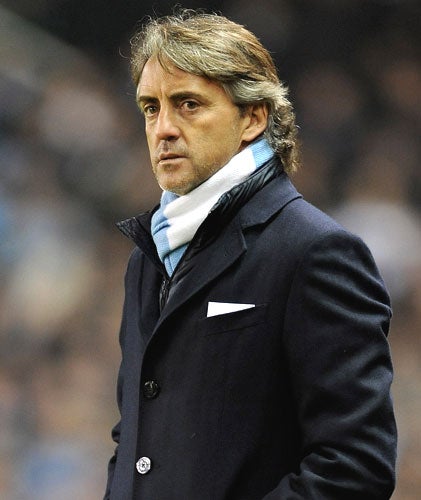Tim Rich: Manchester City's world domination must wait

The bucket of cold water thrown over Harry Redknapp by his own players, as the Tottenham manager celebrated qualification for the Champions League, is nothing compared to what metaphorically has been poured over Manchester City. World domination will have to wait; for the moment there is the Europa League and matches against the third best team in Greece to look forward to.
On his arrival at Eastlands, Roberto Mancini explicitly targeted the Champions League by May and the championship in 2011. He was operating to an oligarch's timetable – the kind that saw Roman Abramovich clutch the Premier League trophy 18 months after buying Chelsea. He implicitly understood the type of men he was working for.
Mancini is a better politician than his predecessor, Mark Hughes, who was ill at ease in face-to-face negotiations either with Abu Dhabi United or with other clubs – Everton and Tottenham, who were both offended by the way Eastlands conducted transfer business, coincidentally, took 12 points from Manchester City. Mancini is a smoother negotiator, although it seems increasingly clear that his support within the dressing room is eroding.
If Mancini is likely to survive, his spending plans will not. The suggestion, made by Redknapp, that you can recruit anyone when you are offering £200,000 a week is only half right and in doing so Manchester City may sow the seeds of their own destruction. It is one of Alan Hansen's mantras that nothing divides a dressing room like money, even among millionaires.
Recruiting for a wealthy club, whose entire involvement in the European Cup consists of one first-round tie in 1968, is rather like recruiting for those rebel cricket tours of South Africa in the 1980s. You can buy talent but it will tend to be those with a reason for going.
When Hughes and Mancini directed Manchester City's transfer policy it was towards young, high-class talent like Nigel de Jong and Adam Johnson, whose names would not necessarily mean much in Abu Dhabi but who represent a sound and intelligent investment for the future. The problems have always been with what the club's chief executive, Garry Cook, calls the marquee signings, whose origins lie outside the manager's office.
To borrow one of Cook's phrases both Kaka and John Terry “bottled” their transfers to Eastlands. They may, in relative terms, be slightly wealthier had they come to Manchester but at Real Madrid and Chelsea they are at least competing for championships. Both had sound reasons to stay or go elsewhere just as Fernando Torres, however dissatisfied he is at Liverpool, will have better offers in purely football terms.
Carlos Tevez, Emmanuel Adebayor and Robinho all had grievances with their clubs, who by and large considered them more trouble than they were worth and, the Argentine apart, they are still too much trouble. Expensive transfers fail just as regularly as the routine deals - a problem that Real Madrid tried to solve by signing only footballers considered too good to fail, whom they called galacticos.
But while Manchester City can match the Madrid of Florentino Perez for money, they are leagues away in terms of prestige. When, last Sunday, Carlo Ancelotti took Chelsea to Liverpool it was the first time a man who as a player and manager had spent his entire career in the forefront of the European game had ever set foot in Anfield.
Those who yearn for revolution yesterday should ask how many first-rank Champions League footballers have ever been inside the City of Manchester Stadium and console themselves with the thought that a decade ago you could have said the same of Stamford Bridge.
Join our commenting forum
Join thought-provoking conversations, follow other Independent readers and see their replies
Comments